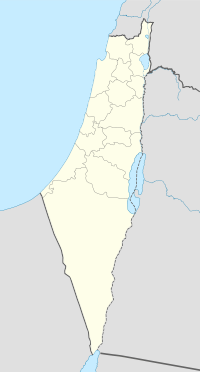Zayta, Hebron
| Zayta | |
|---|---|
| Arabic | زيْتا |
| Name meaning | oil |
| Also spelled | Zeita |
| Subdistrict | Hebron |
| Coordinates | 31°38′25.46″N 34°49′24.91″E / 31.6404056°N 34.8235861°ECoordinates: 31°38′25.46″N 34°49′24.91″E / 31.6404056°N 34.8235861°E |
| Palestine grid | 133/116 |
| Population | 330 (1945) |
| Area | 10,490 dunams 10.49 km² |
| Date of depopulation | July 17–18, 1948 |
| Cause(s) of depopulation | Military assault by Yishuv forces |
Zayta (Arabic: زيْتا Zaytā) was a Palestinian Arab village in the Hebron Subdistrict in Mandate Palestine. During Crusader rule in Palestine, the village is mentioned as forming part of the landholdings of the Order of St. John. At the time of the rule of the Ottoman Empire, according to the 1596 census, Zayta had a population of 165. Mentioned by Western travellers to the region in the 19th century, it is described by one as, "a picturesque Arab village"; by 1945, its population was 330 inhabitants.
Zayta was depopulated during the 1948 Arab-Israeli War between July 17–18, 1948. Its inhabitants became refugees, ending up the West Bank and Gaza Strip. All that remains of the village structures is the well that served as its main water source.
Zayta was situated on a hill between Beit Jibrin and Jusayr. Wadi Zayta ("Zayta Valley"), known in biblical times as Zephathah, was located 1 km to the south.
During the British Mandate in Palestine, the village moved 1.5 km to the north, leaving the original site (known as Khirbat Zayta al-Kharab) on the southern bank of the wadi, as it was too close to waters that had become stagnant, breeding insects and disease.
In 1136, at the time of the Crusades, the fortress of Bethgibelin and ten villages in the area around Hebron were granted to the Order of St. John by Hugh of Hebron at the request of King Fulk. The King also bequeathed four additional villages to the grant assigned to the Order, one of which was Zayta. Crusader rule over Zayta and the surrounding area came to an end after Saladin's defeat of Crusader forces in 1192.
...
Wikipedia

